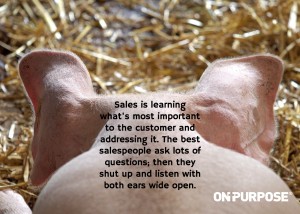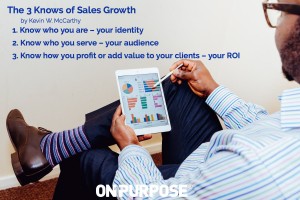When was the last time a salesperson convinced you to buy something? And how did that purchase work out for you?
Some salespeople see selling as a win–lose competitive game of point–counterpoint verbal combat. Be careful! It can work, but it is a highly skilled game that walks a fine line between providing the needed information and intimidating the buyer into a purchase—once!
Sales is learning what’s important to the customer and addressing it.
The best salespeople ask lots of questions; then they shut up and listen with both ears wide open.
For example, in technical sales where buyer and seller are highly qualified and knowledgeable, this approach can be an act of sizing up and iron sharpening iron. Generally, you’ll find that it is the buyer, not the seller, who initiates this more pressured approach.
Be careful, however, because the difference between healthy banter and an unhealthy, dominating buyer may be a very thin line. In the latter case, a humble, noncombative approach may serve you best. In other times, the better the banter, the better your chances. Skilled salespersons can turn it on or off depending upon the buyer’s style and by assessing the appropriateness of the situation and person.
In a sales situation where the seller knows more than the buyer and the buyer is communicating the need for input or insight, attempts by the seller to convince the buyer often result in a buyer turnoff. The buyer may sense that the seller is more interested in making the sale than consulting or serving them with integrity. In short, they don’t trust the salesperson. When that happens the transaction is disadvantaged.
One of the great challenges in selling today is the leveling effect of information from the internet. Most buyers can find tons of information, reviews, and competitive analysis on goods and services. Therefore, as a salesperson or business owner who is selling, counting on your strategic advantage as being more informed than the buyer is a dangerous proposition. In fact, you may be more knowledgeable and experienced than the buyer, but to try to argue or convince the buyer sets up a high-risk scenario for creating distrust. Humility, not hubris, is the better path.
One of your strategic advantages and value propositions is the diversity of clients and customers you’ve worked with. In other words, you see patterns of use and abuse. You’re able to borrow from the experience of other customers and advise clients as to likely scenarios they may encounter and may not have anticipated.
Those involved in selling often find themselves in a really tough place.
From the strength of their knowledge and conviction, they perceive they know exactly what their client or customer needs, yet the client isn’t buying. Your natural inclination may be to lean into the act of convincing them with an even more reasoned set of facts, benefits, and features why this is the right purchase for them. Just how convincing do you think you’ll really be?
When that urge to tell overtakes your tongue consider just the opposite approach. Ask more questions. Ideally, you have what I call a “patterned conversation” in which you have a strong sense of what needs to happen (a pattern of questions that leads to an informative and insightful exchange) but not a preconceived notion of where it may lead.
Ultimately, buyers are looking to advance their larger goal.
If you don’t know the larger goal then you’re not really listening and learning what’s at stake.
Getting into a “convincing-fest” is rarely your best approach for earning the relationship and sale. It is often an indication of a salesperson who is taking shortcuts or is using dominance or personality or style to pressure someone into doing something they don’t want. This manipulation, however, can work.
Alternatively, there’s a time when a customer needs to be led to their decision. Leveraging your experience and capacity to anticipate their needs, you’ll take them along the path of discovery versus jumping to the final destination. It takes more time, but it often makes for a better solution for the client because you, too, will learn some things along the way and be able to provide a more valuable end result. Truth be told, you can make a sale or you can build a relationship. Ideally, you do both.

